Freemind vs Freeplane
June 18, 2023 | Author: Adam Levine
10
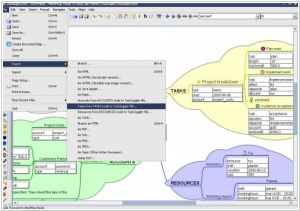
FreeMind is a premier free mind-mapping software written in Java. The recent development has hopefully turned it into high productivity tool. We are proud that the operation and navigation of FreeMind is faster than that of MindManager because of one-click "fold / unfold" and "follow link" operations.
7
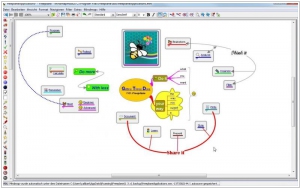
Freeplane is a free and open source software application that supports thinking, sharing information and getting things done at work, in school and at home. The software can be used for mind mapping and analyzing the information contained in mind maps. Freeplane runs on any operating system that has a current version of Java installed. It can be run locally or portably from removable storage like a USB drive.
See also:
Top 10 Mind Mapping software
Top 10 Mind Mapping software
FreeMind and Freeplane are both popular open-source mind mapping software tools used for visualizing ideas, concepts, and information, but they have some key differences:
User Interface and User Experience: FreeMind and Freeplane have similar user interfaces and user experiences, as they are both based on the same core mind mapping principles. However, they may have some differences in terms of layout, design, and customization options. FreeMind may have a more minimalistic and straightforward interface, with a focus on simplicity and ease of use. Freeplane, on the other hand, may have a more polished and feature-rich interface, with more customization options, such as the ability to create different node shapes, styles, and colors.
Features and Functionality: FreeMind and Freeplane offer similar core features, such as creating mind maps with branches, adding topics and subtopics, adding images, attachments, and notes, and customizing the appearance of mind maps. However, they may have some differences in terms of advanced features and functionalities. Freeplane may have more advanced features, such as the ability to create mind map templates, use conditional formatting, create mind map styles, and embed multimedia content. FreeMind, on the other hand, may be more focused on simplicity and may not have as many advanced features as Freeplane.
Development and Updates: FreeMind and Freeplane are both open-source software tools, which means that they are developed and maintained by a community of volunteers. However, they may have differences in terms of development activity and frequency of updates. FreeMind may have a smaller development community, with less frequent updates and new features. Freeplane, on the other hand, may have a larger development community, with more frequent updates and improvements. This may result in differences in terms of stability, bug fixes, and availability of new features between the two tools.
Compatibility and Platform Support: FreeMind and Freeplane are both Java-based software tools, which means that they can run on multiple platforms, including Windows, macOS, and Linux. However, they may have differences in terms of platform support, compatibility, and performance. Freeplane may have better compatibility with the latest Java versions, which may result in better performance and stability on newer operating systems. FreeMind, on the other hand, may have limitations in terms of compatibility with the latest Java versions, which may impact its performance and stability on newer operating systems.
Community and Support: FreeMind and Freeplane both have active communities of users and developers, providing support, documentation, and user forums. However, the size and activity level of their communities may vary, which may impact the availability of support and resources. Freeplane may have a larger and more active community, with more extensive documentation, user forums, and tutorials, which may provide more support options for users. FreeMind, on the other hand, may have a smaller community, with fewer support resources available.
In summary, the main differences between FreeMind and Freeplane lie in their user interface and user experience, features and functionality, development and updates, compatibility and platform support, and community and support.
See also: Top 10 Mind Mapping software
User Interface and User Experience: FreeMind and Freeplane have similar user interfaces and user experiences, as they are both based on the same core mind mapping principles. However, they may have some differences in terms of layout, design, and customization options. FreeMind may have a more minimalistic and straightforward interface, with a focus on simplicity and ease of use. Freeplane, on the other hand, may have a more polished and feature-rich interface, with more customization options, such as the ability to create different node shapes, styles, and colors.
Features and Functionality: FreeMind and Freeplane offer similar core features, such as creating mind maps with branches, adding topics and subtopics, adding images, attachments, and notes, and customizing the appearance of mind maps. However, they may have some differences in terms of advanced features and functionalities. Freeplane may have more advanced features, such as the ability to create mind map templates, use conditional formatting, create mind map styles, and embed multimedia content. FreeMind, on the other hand, may be more focused on simplicity and may not have as many advanced features as Freeplane.
Development and Updates: FreeMind and Freeplane are both open-source software tools, which means that they are developed and maintained by a community of volunteers. However, they may have differences in terms of development activity and frequency of updates. FreeMind may have a smaller development community, with less frequent updates and new features. Freeplane, on the other hand, may have a larger development community, with more frequent updates and improvements. This may result in differences in terms of stability, bug fixes, and availability of new features between the two tools.
Compatibility and Platform Support: FreeMind and Freeplane are both Java-based software tools, which means that they can run on multiple platforms, including Windows, macOS, and Linux. However, they may have differences in terms of platform support, compatibility, and performance. Freeplane may have better compatibility with the latest Java versions, which may result in better performance and stability on newer operating systems. FreeMind, on the other hand, may have limitations in terms of compatibility with the latest Java versions, which may impact its performance and stability on newer operating systems.
Community and Support: FreeMind and Freeplane both have active communities of users and developers, providing support, documentation, and user forums. However, the size and activity level of their communities may vary, which may impact the availability of support and resources. Freeplane may have a larger and more active community, with more extensive documentation, user forums, and tutorials, which may provide more support options for users. FreeMind, on the other hand, may have a smaller community, with fewer support resources available.
In summary, the main differences between FreeMind and Freeplane lie in their user interface and user experience, features and functionality, development and updates, compatibility and platform support, and community and support.
See also: Top 10 Mind Mapping software
Freemind vs Freeplane in our news:
2017. Freemind - free MindNode alternative
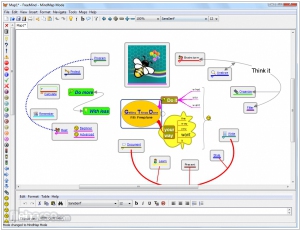
FreeMind is a mind-mapping software that operates on an open-source framework, providing competition to solutions such as MindNode and other similar tools. The software employs a familiar structure of points (referred to as nodes in FreeMind) branching out from a central topic, with additional nodes stemming from each branch. However, FreeMind truly distinguishes itself with its user-friendly click-and-drag interface, facilitating quick editing. Additionally, it offers HTML support, simplifying the sharing and navigation of your mind maps. Despite its somewhat outdated appearance and cumbersome menu system, FreeMind shines with its ease of use, offering convenient keyboard shortcuts for common tasks such as creating new nodes and applying formatting to ensure organizational efficiency. With a bit of time spent mastering its shortcuts, you'll discover that FreeMind is an incredibly valuable tool for project planning, exam preparation, and brainstorming new ideas.
2014. Freeplane - a new open-source brainstorming tool
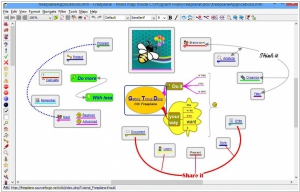
The recently launched open source mind-mapping software, Freeplane, is an enhanced and reimagined version of FreeMind, offering a range of features to create comprehensive and dynamic mind maps. In addition to building traditional static mind maps, Freeplane introduces intelligent tools to enhance map creation. For instance, the program incorporates conditional styling, automatically applying your preferred visual appearance to nodes based on their hierarchical level and content. The content within nodes can be highly interactive, allowing you to hide information, present it on demand or automatically, organize it using folding branches, and utilize hyperlinks for seamless navigation. The software also includes built-in calendar and reminder tools, enabling efficient management of tasks and projects. Furthermore, it offers DES encryption for individual nodes or the entire map, ensuring data security. Freeplane can be expanded through the use of scripts and various intriguing add-ons. Once the mind map is complete, it can be shared as an image, an HTML page, through Flash, and more, providing versatile sharing options.
2013. Freemind 1.0 adds real-time collaboration
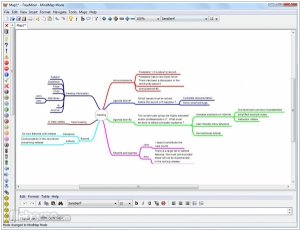
The latest iteration of mind-mapping software FreeMind has been launched, marking its first official version by number, although not its initial release. This update introduces significant new functionalities such as cloning, collaboration, and geographical maps. Users can now clone nodes and their sub-nodes, ensuring synchronization between the two copies. Multiple individuals can collaborate simultaneously on the same map, fostering efficient teamwork. Additionally, the ability to restore complete sessions has been implemented. Another notable addition is location-based mind mapping, offering users enhanced context for their maps. Furthermore, the inclusion of a spell checker serves as a valuable usability enhancement.



